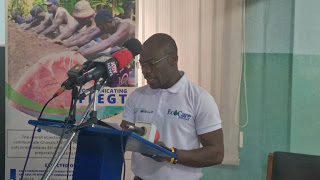The Parliament of Ghana, Ministry of Lands and Natural Resources and the Forestry Commission has been urged to speed up the enforcement of the law that convert extant leases and permits to valid timber utilization contracts.
This, EcoCare Ghana believes will enhance successful issurance of Forest Law and Enforcement, Governance and Trade (FLEGT) license before the end of 2020.
However, the failure to enforce the issurance of FLEGT license would affect the already depleting climate situation of Ghana.
Speaking at a press briefing in Accra, the Managing Campaigner, Obed Owusu-Addai explained that, only 4% of all existing timber contracts meet the Voluntary Partnership Agreement (VPA) criteria for valid timber right whilst majority of remaining 96% are extant leases and permits that need to be converted to timber utilization contracts (TUCs) ratified by Parliament.
He attributed the current problem to the failure of Forestry Commission and the Ministry of Lands failed to set in motion the processes to convert these extant and and permits since 1998, when the timber resources management Act, 1998 (ACT547) which made these extant leases illegal, was passed.
This failure he noted may affect future commitments and declarations made by Ghana on such bilateral/multilateral commitments.
“If Ghana’s failure to issue a FLEGT license this year could also raise further barriers for our already ailing timber industry,” he claimed.
Therefore it is crucial and important for the conversation process to be concluded and submitted to Parliament because Ghana’s credibility on the international timber market and in the eyes of the European Union in particular is at stake, Obed Owusu-Addia emphasized.
Adding that, Ghana has been presented with an opportunity to become only the second country in the world and the first in Africa to trade in FLEGT licensed timber.
And that, a successful issuance of FLEGT license will also greatly remedy the country ailing timber industry and assist in redirecting much needed funds and staff time from being used in responding to due diligence requests and invest them in supporting the welfare of their workers in this covid-19 pandemic.
It is in this regard EcoCare Ghana has commended the current Chief Executive Officer (CEO) of Forestry Commission for his leadership in the process so far.
Currently, the Managing Campaigner revealed that, Forestry Commission has begun the conversation process that, a list of over hundred contracts have been prepared and submitted to the Ministry for signature and onward submission to Parliament for ratification.
“The Civil Society is very proud of the milestones Ghana has achieved collectively, and predged to support government of Ghana to complete the process in accordance with Ministry of Lands and Natural Resources timelines of issuing a FLEGT license before or by the end of 2020”, he said.
Forest Law Enforcement, Governance Trade (FLEGT) licences are documents issued by timber-producing countries like Ghana that have ratified a Voluntary Partnership Agreement (VPA) with the European Union (EU).
The licences confirm that timber or timber products comply fully with the relevant laws of the country of export for FLEGT-licensed timber and timber products are considered to comply with the requirements of the EU Timber Regulation, which prohibits EU importers and EU timber producers from placing illegally harvested timber and timber products on the EU market. EU importers therefore do not need to undertake further due diligence on FLEGT-licensed timber.
In order for a Voluntary Partnership Agreement (VPA) country to issue FLEGT licences, it must put in place a timber legality assurance system and other measures outlined in the VPA. When fully operational, VPA timber legality assurance systems are robust and credible.
Legality assurance systems control supply chains, verify legal compliance and are independently audited and are built on practical definitions of legality that have been developed through participatory processes involving stakeholders from government, the private sector and civil society.
FLEGT licences therefore indicate that products comply with a broad range of laws and regulations in the partner country, such as a selection of those relating to forest management, environmental aspects, labour rights, community benefits, import and export procedures, and payments of fees and taxes.
Source: www.thenewindependentonline.com/ Ishmael Barfi








